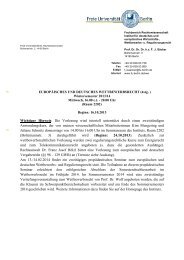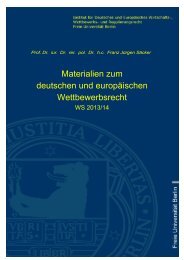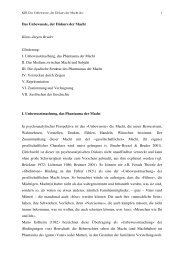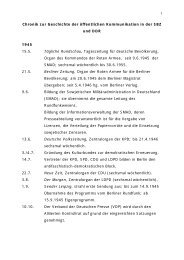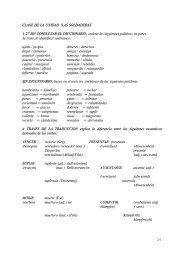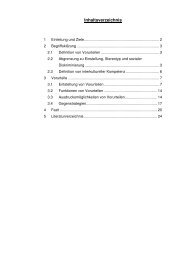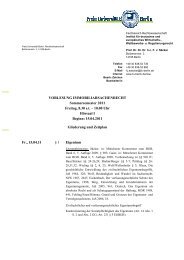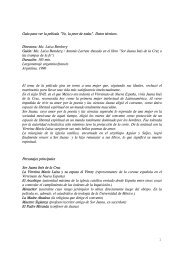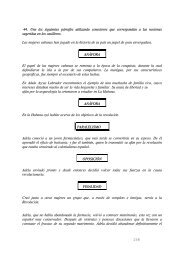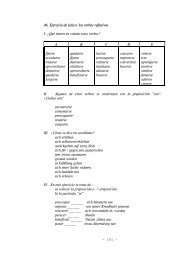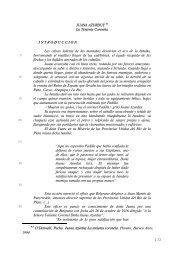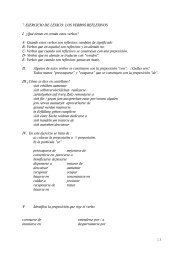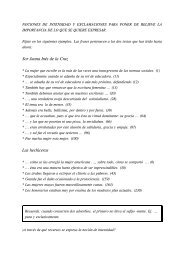Hollow-sounding jubilees - Freie Universität Berlin
Hollow-sounding jubilees - Freie Universität Berlin
Hollow-sounding jubilees - Freie Universität Berlin
Create successful ePaper yourself
Turn your PDF publications into a flip-book with our unique Google optimized e-Paper software.
<strong>Hollow</strong>-<strong>sounding</strong> <strong>jubilees</strong>:<br />
Forms and effects of public self-display in Wilhelmine Germany<br />
Bernd Sösemann<br />
1<br />
Contemporaries referred to Wilhelm II’s time of government before 1914 as an ‘age of<br />
festivities’ and speeches. i In 1913, the Sozialdemokratische Flugschriften commented: ‘The<br />
amount of official celebrations that the German Empire has had to endure over these last<br />
twenty-five years has been seemingly endless. They follow each other as uninterruptedly as<br />
film-reels do in a cinema. […] And each festivity is a ‘milestone’, each is glorified by<br />
speeches […].’ ii The Kaiser’s appearances in public are revealing processes of public<br />
communication. Contemporaries counted among them ‘national public holidays’<br />
(Nationalfesttage), ‘state celebrations’ (Staatsfeste), regional and local events as well as a<br />
number of other public holidays and <strong>jubilees</strong> of very different natures. Addresses, speeches<br />
and toasts formed part of these, as did marches and parades, flags and standards, obelisks<br />
and memorials, illuminations, torch-lit processions and fireworks, church visits, poems, songs<br />
and the ‘Hohenzollernfestspiele’ in the new opera house (Neues Königliches Operntheater).<br />
The court ceremonial planned all details and accompanied the media from the first<br />
announcement of an event to the publications which were intended to record and secure its<br />
fame for the future.<br />
As in most monarchies at the end of the nineteenth century, in the German Reich and in<br />
Prussia, the birthday of the ruler and his more famous ancestors, selected historical events,<br />
funerals and the coronation formed the core of an increasingly secularized culture of<br />
celebration. iii Laws and decrees stipulated whatever was necessary for this. For example,<br />
shortly after acceding to the throne, Wilhelm decreed that forthwith all schools should<br />
commemorate the birthdays and anniversaries of the deaths of his two predecessors ‘as<br />
patriotic days of remembrance’. iv The Kaiser and his advisers had interpretive power over an<br />
event – often, although not consistently, they exercised this in agreement with the<br />
government. They attempted to transform ideas and programmes and the results of history<br />
from a Prussian-dynastic perspective into an immediately recognizable social reality. Thus<br />
the Neue Preußische (Kreuz) Zeitung commented on the occasion of the celebration of 22<br />
March 1897:<br />
The character of national festivities, even when the concern the celebration of a famous<br />
personality, a ruler or a statesman, is influenced by the feelings of large sectors of the<br />
population to such an extent that the person to whom the celebration appears predominantly
2<br />
as the embodiment of some national idea, an idea to which large parts of the population are<br />
attached. v<br />
Moreover, the Kaiser and his advisers gave validity to an official canon which included legally<br />
fixed religious and secular holidays, ranging from Whitsun to Sedanstag. vi They documented<br />
the lifestyle and self-confidence of the monarch, the ‘grandeur’ of the monarchy and the<br />
state, of court and society, by distinguishing and accentuating the festivity and its<br />
programmatic aim in as obvious and impressive a way as possible, using personnel,<br />
architecture, ceremony and symbolism to do so. vii Wilhelm himself offered a definition of such<br />
festivities, arguing that the national holidays were ‘particularly comforting in these fastmoving<br />
times which are so dominated by economic and political interests, for they force one<br />
to halt for a moment in the haste of the working life and to look at the past.’ viii Other<br />
contemporary commentators offered a more grandiose interpretation still: ‘What is the task of<br />
the Jubilee of 1913? – To remind the German that this is about his very own business, his<br />
own pride, and his best effort. It was not just the wars of liberation in which this power<br />
unfolded, but it was completely contained within them; it was a strong punch into world<br />
history.’ ix<br />
Extraordinary in character, clearly distinguished from everyday life and aimed at long-term<br />
effect, all spectacular public celebrations helped to form and solidify collective memories.<br />
Politics of mentality and culture, historical ceremonial and art-forms, personal love of pomp<br />
and offers of integration culminated in these major events. x State celebrations were thus able<br />
to contribute repeatedly and long-term to the visualization, legitimization and authenticity of<br />
control and power, as long as the organizers used the media intelligently and adapted<br />
themselves to the particular possibilities and forms of public communication offered by them.<br />
Under these conditions various versions of a celebration, in writing, drawing and<br />
photography, theatre and festivals, sound, narratives and rumours, which could be repeated<br />
any number of times, continued to have an effect over and above the ephemeral public<br />
event.<br />
From the perspective of communications history, it was not just public appearance of the<br />
monarch, his actions or speeches, that were centre-stage, but to almost the same degree the<br />
audience, and with that different forms and methods of conveying meaning and the varying<br />
contexts in which such meanings were understood. As Friedrich Naumann once noted, an<br />
Emperor’s words have a stronger effect if he repeat something which has been said before:<br />
‘In such cases it is the Emperor who stamps his image onto the copper of an everyday<br />
opinion and thus turns it into a national coin. […] Given the nature of the German Empire it is
very difficult to distinguish between a private point, publicized at the Kaiser’s behest, and a<br />
direct imperial announcement.’ xi<br />
3<br />
Wilhelm II appeared in public more often than any of his predecessors. While his<br />
participation in the business of government was arbitrary and irregular, even sporadic, he<br />
displayed a disproportionately greater sense of responsibility when it came to invitations to<br />
holidays and celebrations, the suggestion of festivities, and his personal involvement in the<br />
planning of the programme and the stage-management of the event. Your Majesty explained<br />
yourself how important it is when the Kaiser and Kaiserin personally attend a festivity and<br />
thus uphold its national importance. xii The files reveal not only with how much commitment<br />
and decisiveness Wilhelm exercised his ‘personal rule’ xiii in this respect. They also reveal<br />
how densely the Kaiser’s diary was cramped with this kind of public engagements and what<br />
a huge effort was afforded to his domestic and foreign trips, and to the planning of a suitably<br />
majestic appearance even down to the small provincial towns. Given the knowledge of the<br />
complex demands placed upon a modern-day government, this is surprising. Little wonder<br />
that the former minister of war Karl von Einem (Minister of War from 1903-1909) concluded<br />
in 1915:<br />
‘We have not had a functioning head of state for 25 years.’ xiv Instead, the head of the<br />
German Reich worked equally hard in the officers’ mess and on the dance floor as he did on<br />
stage and exercise ground. In the latter years of the Kaiserreich, the value of such festivities<br />
was determined primarily by the Kaiser’s opinion and his preferences, and much less by<br />
dynastic or class-representative concerns or general power-political necessities.<br />
Therefore the politically disparate development of the latter years of the Kaiserreich shall be<br />
investigated in terms of public reception within the media, and thus within the context of<br />
public life from a perspective, and with the help of documents, that have until now been<br />
neglected. xv This includes subjects which were dealt with in literary or theatrical ways, as well<br />
as public celebrations and union, church or party congresses, newspapers and (specialized)<br />
journals, official commemorative publications, competitions, flyers, memorials, uniforms and<br />
flags, coins and medals.<br />
An addition to the traditional media of picture stories and illustrated journals, caricatures and<br />
posters was the latest medium of film. xvi Wilhelm II used it in connection with the celebrations<br />
in honour of Queen Luise by authorizing and supporting the first film on Luise. xvii The<br />
countless, usually spontaneous speeches of the Kaiser xviii , often delivered to ambivalent or<br />
even disastrous effect, are as much to consider as the symbol-laden staging of his<br />
appearances at manoeuvres and the naming of ships, unveilings of memorials or blessing of
4<br />
flags, opening of buildings or exhibitions xix , parliaments and factories, welcoming of<br />
deputations or organizations. In each case the presentation and the medium are of central<br />
importance, as are the conditions for communication and the forms of delivery and reception.<br />
What will be examined is a meaningful sub-section of reality, namely the space of public<br />
communication. For the audience, for people from all groups, classes and walks of life, this<br />
space was filled with questions and answers, with truth and lies – be that the content of<br />
rumours or that of confirmed information, be that insights, realizations, signs or symbols.<br />
An analysis of the changes which occurred in the self-image of the monarchy, in the general<br />
political style, and in public perception in the latter years of the Kaiserreich is made easier by<br />
the fact that Wilhelminism itself was closely bound up with the public. Wilhelm II liked to<br />
demonstrate his ‘closeness to the people’ (Volksnähe) and a certain joviality during his public<br />
appearances. The monarch sought his success primarily in staged events (which, though<br />
largely based on protocol, were planned also by him), that is to say in the circle of those<br />
‘people who crowded around each royal appearance and shouted vivat’. xx This tendency was<br />
more pronounced following the ‘Hun-Speech’, the first climax in a whole series of negative<br />
experiences with imperial self-representation. xxi For the rhetorical slip made by the Kaiser<br />
when seeing off the troops bound for the war against the Boxers on 27 July 1900, by no<br />
means a singular or isolated mistake, led in the autumn of that year to a serious loss of<br />
popularity for the monarchy. This was despite extensive attempts at calming the situation<br />
which were embarked upon immediately following the speech. xxii<br />
In the Reichstag, within the political parties and the public, the Kaiser’s reputation had<br />
suffered to such an extent that what still remained of the already corroded ‘royalist capital’ xxiii<br />
now threatened to dissolve further even in conservative and generally monarchist circles.<br />
Already a decade earlier, Die Zukunft had asked:<br />
‘How can it be that his [Wilhelm’s] words, intended to evoke a new mood for celebration,<br />
nonetheless had such a negative effect on the sensibility of even the most reliable<br />
monarchists? This effect is produced by the tone, not by the meaning of the words – and<br />
once more on this occasion it was the tone that caused the anxiety.’ xxiv The Kaiser’s<br />
discourse, at best intended to be ‘popularizing’, had failed not only due to the monarch’s<br />
weak self-control, his failure to follow individual and collective ministerial advice, and his lack<br />
of tact, but primarily because of an insufficient sensitivity vis-à-vis the media and because of<br />
the strategy of conflict which he directed most pointedly at journalists. Wilhelm II wanted to<br />
be ‘modern’ and to have a public effect. He did possess the gift of approaching people and<br />
succeeded when he appealed directly to his audience xxv , but he lacked a deeper<br />
understanding of the media and the ‘press market’.
5<br />
His advisers did not even succeed in convincing him to study a modest file of press-cuttings<br />
on a regular basis. xxvi Thus Wilhelm II did not develop a deeper understanding of<br />
contemporary discourse or even a modest sensitivity for the changes taking place in society<br />
and mentality. This is also why his sporadic and amateurish attempts to instrumentalize<br />
individual publications or editors had to fail. The study of which this essay forms a part<br />
begins its analysis of festivities and public celebrations, particularly within the media, in<br />
1896/97 with the twenty-five year jubilee of the founding of the Reich, at a time when<br />
Bernhard von Bülow was influential in the background xxvii , and continues until October 1913,<br />
with the unveiling of the Völkerschlachtdenkmal in Leipzig. xxviii In total, this study takes<br />
account of a large number of public events of importance for the politics of the media, of<br />
culture and society. These include the commemoration of the King’s Coronation of 1701 and<br />
of the Founding of the Reich in 1871, as well as countless birthdays and remembrance<br />
days. xxix<br />
The publication of the Daily-Telegraph-Interview of 28 October 1908 is, from the point of view<br />
of the history of communications, the key event for the investigation of the politics of public<br />
relations with regard to state celebrations. In the ‘six-some’ of communications politics<br />
(Kaiser, Chancellor, Parliament, Media, Journalists, Public/Recipients), the balance changed<br />
dramatically following the Eulenburg scandal and the Daily-Telegraph-Affair. Although<br />
Wilhelm II did restrict his public speeches and conversations for a while following this crisis,<br />
he did not really stop delivering contentious addresses. xxx Since the autumn of 1908, since<br />
this ‘November-Revolution’ xxxi , it is possible repeatedly to demonstrate a latent readiness for<br />
protest in society. xxxii Since Bülow’s fall an increasingly self-confident parliament had had a<br />
chance to practise its inter-fractional desire to shape policies, and this meant that in times of<br />
crisis, this readiness for protest could even be increased.<br />
The ‘Gottesfriede’ (divine peace) xxxiii that the Kaiser and his people had agreed in November<br />
1908 had lasted barely two years when the next big scandal occurred in Königsberg. With<br />
this event Wilhelm had, in the opinion of his critics, returned to his true self and was bound to<br />
suffer the inevitable consequences. xxxiv Democrats, Liberals and Socialists in Germany and<br />
Austria-Hungary all criticized this renewed breach of the domestic peace and regarded it as a<br />
‘call for war’ of a late-comer against constitution and parliamentarianism which would at best<br />
have been worthy of a Tsar. xxxv In public gatherings the SPD protested vehemently against<br />
‘the absolutism proclaimed in the Kaiser’s speech’ and against the ‘irresponsible<br />
powerbroker’ (Drahtzieher). xxxvi They claimed that all of Germany was of the impression that<br />
‘the clique which holds the Kaiser in its hands’, could lead the world towards catastrophe,
6<br />
war or coup d’état. xxxvii Thomas Nipperdey’s interpretation of the last two and a half years<br />
before the war ‘as a stable, not acute crisis’ xxxviii is at best true for the ‘Grosse Politik’ and for<br />
the parliamentary affairs in the Reich. Within the media and the public, including middle class<br />
national-liberal circles, the impression was rather that of an increasing inability to arrive at<br />
convincing and stable long-term crisis management, even where urgent domestic policy<br />
subjects were concerned. The number of demonstrations and strikes, and their vehemence,<br />
size and thematic concerns (for example against the price increases for meat) increased.<br />
Despite economic prosperity, the costs for armaments were becoming an increasing burden;<br />
the policy of the agrarians was increasingly regarded as demagogic, reactionary and<br />
egotistical; in South Germany the anti-Prussian mood grew, as did the polemic in the media<br />
against Prussianism; in the entire country the aversion increased against populist-demagogic<br />
groupings such as the old-established Pan-German League (1891-94), as well as the newly<br />
founded ‘German Army League’ (1912) and the ‘Prussian League’ (1913). At the same time<br />
there was a popular loathing of the ‘militarization’ of politics and society (evidence of which<br />
seemed to be provided by the Zabern affair).<br />
The focal point of the Kaiser’s popular activities shifted after 1910 time towards festivities<br />
which were more restricted by ceremony. The Chancellor lost influence vis-à-vis the monarch<br />
and parliament. The Reichstag and the media increased their importance for public discourse<br />
despite the fact that initiatives for legislation to change the constitution had failed. Under<br />
such conditions, increased domestic pressure had to result, especially when in addition a<br />
nationalist right wing protest developed among the public, as happened later in the Moroccan<br />
Crisis. xxxix While the ceremony of festivities and the rituals of public holidays protected the<br />
Reichstag from direct degradation of parliament and its members, or the Social Democrats<br />
from drastic attacks by the Kaiser, it did not protect the monarch’s opponents completely<br />
from his spontaneous outbursts or exaggerated displays of overbearing views of divine right<br />
and absolute power to rule within the perceived sanctuary of the Brandenburg Landtag.<br />
Following the Daily Telegraph scandal, the politics of communication and reception had<br />
changed. This was a significant, broad shift, and provided a new basis for the final years of<br />
the Kaiserreich. No subject and hardly a politically interested person remained untouched by<br />
it, because the shock it caused in public and parliamentary life, as well as in the media- and<br />
party-political scene, was given more attention and was more strongly registered, analysed,<br />
interpreted and reacted to than ever before.<br />
If Nipperdey considers the majority of voters to have been hardly touched by the crisis and if<br />
he concludes noticeably vaguely that the Kaiser’s self-esteem had ‘of course […] suffered a
7<br />
blow since then’ xl , then he exaggerates the importance of the external factor that the public<br />
unrest and the revolutionary upsurge among radical Socialists calmed down after a while.<br />
The disturbance had at times taken on revolutionary traits in public discourse and was able<br />
to continue in less spectacular, but politically no less important ways. The politicization of the<br />
public, the parliamentarization of government work, the self-confidence of the oppositional<br />
powers, and the importance and scope for influence of the media had, however, not come<br />
about just at that point. They had merely increased and grown, so that in contrast with the<br />
time before the ‘November storms’ of 1908, any criticism or defence of the monarch, of the<br />
person or deeds of the Kaiser or the Hohenzollern, of the social and constitutional situation of<br />
the Reich or Prussia had to be more fundamental. xli In addition, the repertoire of convincing<br />
excuses had decreased, and their recipients, both at home and abroad, were increasingly<br />
less inclined to disregard ‘spontaneities’, ‘clumsiness’ and discrepancies between the spoken<br />
word and the government’s official version of an imperial speech. xlii The Kaiser’s word had to<br />
lose its impact if discussions arose in the press over the different versions of a speech or the<br />
meaning of a word, for ‘nothing is worse’, as the <strong>Berlin</strong>er Tageblatt commented, ‘than if the<br />
other, perhaps exaggerated and vulnerable interpretation [of a speech] has become firmly<br />
stuck in the heads [of the public]. And as is known, the subsequent semi - or completely<br />
officious corrections do not enjoy a high regard among our people.’ xliii<br />
At the same time, excuses such as lack of experience or likeable shortcomings which were<br />
explicably ‘human’ were hardly able to have calming or apologetic effects any longer. This<br />
was because neither had time helped to ‘heal’ them, nor had the negative experiences of the<br />
past led the political advisers and others in positions of responsibility to manage such<br />
situations with more imagination and determination. Following the turn of the century the<br />
unease with which the abundant public celebrations were received turned into ever more<br />
strongly voiced public criticism. ‘We won’t join in the celebration!’, the Vorwärts declared in<br />
1913:<br />
We stand uninvolved on the sideline and shrug our shoulders when a frothing wild water of<br />
celebratory speeches, articles and hurrahs pours over the country. We know how much<br />
despicable hypocrisy is voiced in this noisy carry-on, and we know how convinced<br />
monarchists talk about the carrier of the crown when they are in private – if all the lèsesmajesté<br />
were known that are uttered in these circles, the prosecutors would have to<br />
introduce night shifts. xliv<br />
But the disapproval of parties and editors, even those of conservative leanings, only<br />
heightened Wilhelm’s triumphant displays and the increasingly inappropriate desire to
impress of a statesman who was visibly failing to mature. In this context the <strong>Berlin</strong>er<br />
Tageblatt commented:<br />
8<br />
The first and most painful [realization] that we have to emphasise is that we cannot write<br />
without restraint: the Kaiser and his people, or: the German people and their Kaiser. There<br />
are many among us who are lacking the feeling that the personal bond between a master<br />
and his people should be a matter of course. And although doubtless a large majority of the<br />
German people is still currently monarchically inclined it cannot be denied that this<br />
relationship has shifted to the detriment of the Kaisertum since the death of Kaiser Wilhelm<br />
I. xlv<br />
On the other hand the ‘simple’ subject did not seem to tire of celebrating his Kaiser whenever<br />
the opportunity arose, and appeared to follow his self-confident and exaggerated accounts<br />
with equal enthusiasm even when they modelled themselves on the images of leaders and<br />
politics of bygone eras. But even among these recipients changes were taking place. In<br />
addition, national celebrations were increasingly losing the political profile in favour of public<br />
entertainment. Even the Norddeutsche Allgemeine, on the occasion of the jubilee of the<br />
Kaiser’s accession to the throne in 1913, only published sixteen articles by academics on<br />
legislation and the navy, technical matters or the economy, industry and sport, but without<br />
offering a historical or political commentary on the event itself anywhere in the paper. Die<br />
Gartenlaube restricted itself to a double-page reproduction of a drawing depicting part of the<br />
formal dinner in the Kaiser’s Schloss. xlvi The preparation of the celebrations in the media<br />
decreased, too, and became more one-sided, restricting itself to conventional historical<br />
paintings or eulogies in which even the weakest of Prussian kings were glorified and in which<br />
Prussia’s path to national unity was related uncritically as an inevitable development. xlvii The<br />
Wilhelmine state was depicted under the motto ‘Ein Volk, Ein Kaiser, Ein Reich!’ as the<br />
culmination and completion of German history. Leaders and commentaries were dedicated<br />
almost entirely to conjuring up political and social unity, economic and military strength, and<br />
to declaring the desire to support the path of the German Reich towards Weltmacht also by<br />
way of journalism. Only occasionally a reflection of reality is visible at the margins where the<br />
fact was not glossed over that there existed in Germany not only differences of opinion, but<br />
profound controversies over constitutional, confessional, economic, party-political and ethnic<br />
questions which could lead to a ‘new Jena’, ‘this time however a domestic Jena (ein inneres<br />
Jena)’. xlviii Festivities and celebrations are no fixed entities, they are not autonomous and do<br />
not contain a purpose within themselves. For Wilhelm II, they not only stood outside of<br />
everyday political life in a peculiar way, but for the biggest group in society they were even in<br />
obvious contrast to it. They were intended to provide a ‘free space’ outside of ‘party
9<br />
quarrels’ xlix , in which harmony and the propaganda-based image of history had to prevail.<br />
This protective zone was intended to deflect from politics and economy and at least on the<br />
celebration day itself prevent conflicting interests and arguments. In the process of societal<br />
change and public discourse domestic policy debates developed their own dynamic. As the<br />
Intelligenzblatt commented, such public discourse was seen as ‘a sign of strength and not of<br />
weakness. It is understandable that in times in which the vital interests of the whole seem<br />
secure, the quarrels and differences of interests of the parts come to the fore and seem<br />
temporarily to overshadow the unifying interest.’ l<br />
It was not just the public’s ‘loss of monarchical conviction’ that was detectable in the<br />
Wilhelmine epoch. Lost in its ‘political shape, ‘social atmosphere’ and rhetorical behaviour<br />
were ‘natural authority’ and role model function for the future. li In the ‘democratic current’ the<br />
monarchical aura suffered continually and to a degree that had not even been experienced<br />
during the revolution of 1848/49. As the Kreuz-Zeitung commented in 1913: ‘Never in the<br />
history of the German people, the most monarchical people in its conviction and character,<br />
its customs and habit, has the monarchical thought been so attacked, has the monarchy<br />
faced such a strong front of open and hidden opponents as in this most recent past.’ lii<br />
Wilhelm II did not succeed in developing new, more sophisticated and politically convincing<br />
forms of leadership-aesthetic, suitable for an industrial nation. Demonstrative visits to<br />
factories or an openly displayed interest in modern technology did not suffice to cancel out<br />
the impression of the staged and superficial. The Kaiser did not even manage to change the<br />
traditional ceremonial forms of state and court celebration, so that they could be accepted by<br />
a society that was less guided by league or party dignitaries, and increasingly by middleclass<br />
expectations, and by functionaries and the conditions of a differentiated press. liii In the<br />
latter years of the Kaiserreich public celebrations were reduced to a self-congratulatory,<br />
backward looking and triumphant gesturing liv and an intoxicated national monumental cult. As<br />
a result they were regarded, if not even as completely anachronistic, then at least as a<br />
historicizing political myth lv whose main parts were no longer considered to be appropriate.<br />
The Fränkische Tagespost expressed this unhappiness thus:<br />
Oh, no, the wishes of the present and the hopes for the future of the people are not attached<br />
to such displays of royal splendour and pompous expansion of power, which makes obvious<br />
to everyone the extent to which the privileges (Vorrechte) still connected with royalty, and the<br />
extent of the denial of privileges of the people (Volksentrechtung); to such displays which<br />
swallow hundreds of thousands which have to be paid by the poorest of the poor; to such<br />
displays which aim at giving undeserving gloss to an old and innerly rotten glory in the eyes<br />
of the foolish and the young. […] We no longer rebel against the new German Reich, we
10<br />
accept it, although many millions of Germans remain excluded from it: but even within the<br />
given borders: how much is still lacking from a unity like we envisage it! […] Of course, we<br />
too want to know that the ties which bind us Bavarians to the Reich are unbreakable. But this<br />
makes the demand all the more urgent that this Reich not be placed under the thumb of<br />
Prussia and its Junker-class, that this Prussian coercion does not suffocate these<br />
progressive buds in other states, too, allowing to flower and grow only that which is spiritually<br />
congenial to its reactionary clique. lvi<br />
Even in the case of the Sedanstag the constant evocation led first to a weakening of the<br />
message both journalistically and at the psychological level of reception, then to a partial reinterpretation<br />
lvii and finally even a devaluation of the event. lviii<br />
When Die Gartenlaube published an historical overview and a portrait of Leibnitz on the<br />
occasion of the celebration of the Academy of Science lix , it is true that it chose a less<br />
engaging and original approach than in comparable cases of the immediate past, but at least<br />
this approach does not reveal the same lack of imagination in subject matter, conventionality<br />
in style, and indifference in presentation than the reporting of numerous publications on the<br />
occasion of high-ranking celebrations. The Kreuz-Zeitung claimed: ‘Memorial celebrations of<br />
the old Kaiser, who led us to peace through victorious wars, are more and more clearly<br />
turning into demonstrations for internal and external peace. The creation of the new<br />
Nationalkokarde [national emblem on uniforms] is a step on the way of closer amalgamation<br />
of the German peoples into one German people.’ lx<br />
Although Wilhelm II did not appear prominently during the building and particularly the<br />
inauguration of the Völkerschlachtdenkmal in Leipzig in 1913 – although present, he did not<br />
give a speech for reasons of domestic policy and diplomacy lxi - , the importance for the public<br />
of this state celebration should not be rated lower than that of the Sedanstag or the Kaiser’s<br />
birthday. Thus the Illustrirte Zeitung published two extensive special editions, and the<br />
Leipziger Neuesten Nachrichten summarized its editions from 16-19 October into one special<br />
edition. lxii Die Gartenlaube boasted a large-scale illustration of the ‘gigantic scaffolding’ during<br />
the building of the memorial, without however emphasizing more than the technical aspects<br />
of it, while reporting the usual fare in its four-page highly illustrated spread on the ‘Battle of<br />
Leipzig’. lxiii This relative restraint was most obvious on the occasion of the inauguration of the<br />
Völkerschlachtdenkmal, which was criticized sharply not only by the SPD. Der Morgen<br />
judged the memorial to be ‘a monster of unprecedented nature’,
11<br />
A contradiction within itself, a symbol of thoughtlessness and of lying helplessness. […] The<br />
greatness of the memorial consists of, of roses the size of men, of toes which weigh a ton,<br />
and of the puffed-up bodies of wrinkled acrobats rolling around. Where in this bombastic<br />
fever of stone is there even a shred of German spirit and thankful belief in our fathers? One<br />
stands crushed by this raw materialism which suffocates all but the last spark of soulful<br />
reflection; one stands hopelessly in front of such advertised exaggeration of such infertile<br />
poverty of thought. This tool of arbitrary power lacks inner proportion, which is why, despite<br />
its many-digit figures, it appears like a toy, like the babble of epigones who want to be heroic<br />
but are actually only childish. lxiv<br />
The editors of Die Gartenlaube celebrated the inauguration with a conspicuously short<br />
illustrated report about the ‘real people’s celebration’ of the ‘German Patriots’ League’,<br />
prefacing it with the statement that the event had passed ‘without any disharmony’. lxv<br />
Because of such critical receptions, these celebrations could have little more than politically<br />
restorative power. Neither the Kaiser nor the court were able to offer appropriate futureoriented<br />
ideals to ‘public opinion’, which had become a recognized ‘power factor of political<br />
progress’, as the Intelligenzblatt had already foreseen in 1899. lxvi All that ‘Wilhelm the<br />
Sudden’ [‘Wilhelm der Plötzliche’], as South German humour mocked him, could offer, was<br />
an exaggerated dynastic consciousness and a populist romanticized expressiveness in everchanging<br />
variations. The ‘Bayreutherization’ of state celebrations served a traditional national<br />
pedagogy. Even under Wilhelm II it utilized the myths of a ‘natural’, purposeful and divinelywilled<br />
rise of Prussia and its ‘German calling’ of national unity, despite the fact that this<br />
Kaiser, in the eyes of an increasing majority, had ‘never achieved anything useful’. lxvii This<br />
imitative monarchical ‘anti-world’ unashamedly demonstrated autocratic features in an<br />
increasingly parliamentarized constitutional state and thus tried to prevent change or reform<br />
programmes. It managed, at least in the conservative and national liberal media, to promote<br />
a favourable journalism consisting of a mostly undemanding eulogizing praise of the ruler. lxviii<br />
However, the critical press, intellectuals and thoughtful contemporaries in the sciences,<br />
politics and the economy missed ideals beyond the fleet and colonies, as well as a deeper<br />
enthusiasm directed at the major issue of imperfect national unity. lxix Friedrich Meinecke<br />
commented in the Kaiser’s jubilee year: ‘Our goals go beyond Fatherland and state, but our<br />
roots are well submerged within it. […] Thus we have entered, even in our inner<br />
development, a danger-zone whose outcome lies in the dark. […] Therefore we lack today<br />
the inclination to brag and boast.’ lxx<br />
The monarch’s pathetic gesturing and the theatrical attitude had to have the ring of an<br />
anachronistic, banal and hollow ‘operetta regime’ (Holstein) amidst the sober prose and
12<br />
statistics of a society that was defined by technology and economy, matter-of-factness and<br />
efficiency. lxxi Only parts of the audience condemned the Kaiser’s speeches as careless<br />
diplomacy lxxii and non-statesmanlike chattiness, as tactless and out of control, or even as the<br />
despicable ‘unmanly childishness’ of a dilettante on the throne who was damaging the<br />
German Reich both at home and abroad. lxxiii War veterans’ associations approved of<br />
Wilhelm’s departure from the ‘old Prussian, measured’ behaviour of his grand-father, from<br />
whom he wanted to distinguish himself in this point in public lxxiv , and also liked his approach<br />
to his God, the ‘great Ally’. lxxv They welcomed the exterior splendour of the celebration and<br />
the ever-present involvement in navy and colonial policy, because this was seen as a way in<br />
which the country could emerge from ‘the shadow of the foundation of the Reich’. lxxvi In the<br />
celebrations of various clubs (singing, gymnastic and war veterans), in university jubilee<br />
speeches and in the pamphlets accompanying state festivities, these images and ideas of<br />
the Kaiser lxxvii can be found particularly in those passages which try to propagate and<br />
legitimize a romanticized image of war which elevates death in battle, as well as trying to<br />
popularize national enthusiasm and willingness for sacrifice. lxxviii Such stylizations, like for<br />
example the Sedan-celebrations, did not explicitly rule out a great war, and called it either<br />
‘people’s battle’ (Völkerschlacht) or ‘world war’. They grounded it historically along a<br />
traditional line which, although verbally conjuring up the ‘ideas of 1813’, was connected with<br />
completely new political ideas. These included the decadence of the western ‘civilizations’,<br />
exaggerated beliefs in the chosen German nation, preparation for a ‘war of beliefs’<br />
(Glaubenskrieg) lxxix , and ideologies which had until then been less well known: the slogan<br />
‘Ein Volk, ein Reich!’ and the idea that the Germans, as a ‘world power’, were faced with a<br />
‘racial war’. lxxx There was criticism of this view of history and its official propaganda, and not<br />
only among the SPD, but also in the national-liberal Bürgertum who regarded the many<br />
celebrations lxxxi , the hollow-<strong>sounding</strong> pathos, the emotions against ‘enemies of the Reich’, the<br />
martial stereotypes and the anti-Polish excesses lxxxii , as well as the diversion attempts of an<br />
obtrusively practised tactics of ‘panem et circenses’ at best as anachronistic and politically<br />
dangerous.<br />
The <strong>Berlin</strong>er Tageblatt commented in 1913:<br />
The German Bürgertum is once again willing to make grave sacrifices for ‘the glory of the<br />
Reich’. But one cannot deny the fact that even for the German Bürgertum there is a point<br />
beyond which it does not want to go. It has been treated as a quantité négligeable for twentyfive<br />
years; now it screams for reforms. […] The Kaiser is the living representative of German<br />
unity. May he become ever more conscious of the fact that this unity has its most secure<br />
roots in the liberty of the people. lxxxiii
However, Die Zukunft had already voiced similar thoughts on the occasion of the Kaiser’s<br />
birthday (and the twenty-fifth anniversary of German unification):<br />
13<br />
A people who are continually confronted with new sensations, who cannot calm down and<br />
develop a certain trust in a steady leadership eventually loses the ability to be able to<br />
distinguish between what is important and unimportant. Unless one was telling lies one<br />
would have to admit that the Kaiser’s birthday is not being celebrated in the mood for which<br />
one would hope and wish. […] Today, when everyone feels that the serious purpose of the<br />
celebration is more directed towards the present than the past, the image is unfortunately a<br />
different one: cheap generalizations are being shouted out […]. Black worries lie over the<br />
land and darken the joy of the glorious past; the enemies ask with scorn if the new Reich will<br />
ever experience a second jubilee […].’ lxxxiv<br />
During the Daily-Telegraph-affair Harden had publicized his views regarding the Kaiser’s<br />
weak leadership in such a sharp way, and had demanded an abdication so forcefully that the<br />
Prussian state minister Paul von Breitenbach in his role as head of the Reichs-office for the<br />
administration of the Reichs-railways immediately forbade the sale of Die Zukunft at railway<br />
stations. lxxxv<br />
The nation does not believe that the almost fifty-year-old will change lxxxvi , will be able to<br />
practise reserve […]. The business of the Reich demands a political temperament, not a<br />
dramatic one. We don’t want a Jupiter who sends lighting from the clouds. […] Wilhelm II has<br />
proven that he is utterly unable to conduct political business […]. The Kaiser is no monarch.<br />
The Reich is sovereign, not the Kaiser […]. We don’t want to be insulted in our cultural<br />
feelings as educated Europeans day after day through speech and writing. We want to<br />
preserve state secrets […], to despise lies, charades (Gaukelspiel) and Byzantine pomp. [We<br />
want to] be able to have alliances again. […] And the old respect will return since it has been<br />
proven that the Germans still dare to have demands even against the Kaiser. lxxxvii<br />
Already by the turn of the century the public no longer regarded Wilhelm II as a personality<br />
who could have an integrative role within society and who could guarantee social cohesion<br />
consensually. Despite the fact that the anti-Socialist laws had not been renewed, the views of<br />
history and politics held by the SPD and those held by the Wilhelmine government were<br />
irreconcilably opposed. lxxxviii The working classes removed themselves from state<br />
celebrations as much as possible and had in any case long begun to celebrate their own<br />
holidays and to develop their own traditions, myths, cults and symbols. lxxxix
14<br />
The state-organized festivities seemed increasingly deficient. Aside from the pomp, they<br />
mirrored an unsatisfactory backward-looking view which was dominated by Prussian<br />
interpretations of history. xc In this way, new anti-Prussian views and prejudices were created<br />
or existing ones confirmed. In addition, Wilhelm gave support, not only abroad, to the<br />
misconception that the German Reich equalled Prussia xci because it identified itself largely<br />
with the same traditions, and because it also glorified the military xcii , sought a militarization of<br />
public life, and had a longing for opportunities to prove itself in foreign policy and in wars and<br />
conflicts in an irresponsible fashion. In the programmes of public display this was<br />
documented with varying degrees of clarity, but it was nonetheless recognizable as a political<br />
concept xciii , whose main features consisted of an exaggerated view of the country’s power<br />
and of increasingly narrowing national-conservative perspectives. xciv Most often these<br />
became more concrete in the attempts to legitimize a provocative patriotism with naval and<br />
world policy. xcv The prevailing messages could be reduced to the following core: all of Europe<br />
lived in continual crisis, a war was not impossible and a larger war, a ‘world war’ could<br />
actually be credited with a positive, progressive potency. xcvi<br />
As a result of the loss of the ‘monarchical aura’ during a worsening domestic political crisis,<br />
the level of attention for symbol-laden festivities and the journalistic commentary on such<br />
official celebrations increased. The planning and the programmes of state celebrations in<br />
Wilhelmine Germany, their order of events and their place in the media offered insights not<br />
only into the political profile and the personal inadequacy of the monarch, but also into the<br />
decreasing effectiveness of the ‘Kaiser myth’ and the increasing ‘social will-power’ of ‘public<br />
opinion’ in regard to the reception of official events and collective memory. xcvii In this way<br />
polarization and a negative general mood grew in a society which was displaying increasing<br />
political openness. The unease regarding Wilhelm’s public appearances and the measures<br />
taken by the state leadership, detectable across the societal divides, promoted a<br />
radicalization not only of the left, but also a rethinking which extended into the political middle<br />
ground. The emphatic identification of the Kaiser with the state, practised over decades, and<br />
the covert, but latently effective identification of the history of Prussia, or rather the<br />
Hohenzollern, with that of the German Reich in official celebrations, connected the public<br />
perception and fate of one person with that of the state. This ideology and societal<br />
development – taken further because of the Kaiser’s strongly reduced and finally entirely<br />
lacking political and media presence during the war xcviii – were among the prerequisites for<br />
the collapse of the monarchy and the revolutionary events of the autumn and winter of<br />
1918/19.
15<br />
i<br />
Gloria industria alitur! – Dedicated to John, friend, critical editor of sources and unbiased<br />
researcher, for 31 May 2002.<br />
ii<br />
‘Dichtung und Wahrheit über 1813’ (Sozialdemokratische Flugschriften 19); <strong>Berlin</strong> 1913, 1.<br />
iii<br />
Sabine Behrenbeck and Alexander Nützenadel (eds.), Inszenierungen des Nationalstaats,<br />
Cologne 2000.<br />
iv<br />
Decree of 9 July 1888. Gerhard J. Bürgel, Die Feier vaterländischer Gedenk- und<br />
Erinnerungstage in der Volksschule, Cologne 1894, p.5. – At that time, days of celebration, in<br />
chronological order, were as follows: January; 18 th , coronation of the King, and foundation of<br />
the Reich; 24 th , birthday of Frederick the Great; 27 th , birthday of Wilhelm II; March; 9 th ,<br />
remembrance of the death of Wilhelm I, 10 th , accession to power of Frederick III; 16 th , the<br />
funeral of Wilhelm I; 22 nd , birthday of Wilhelm I; April; 1 st , Bismarck’s birthday; 30 th ,<br />
Roon’s birthday; Mai; 10 th , Peace of Frankfurt; June; 15 th , death of Frederick III and<br />
accession of Wilhelm II; July 19 th , remembrance of the death of Luise; September; 2 nd ,<br />
Sedanstag; 30 th , Kaiserin Augusta’s birthday; October; 14 th , remembrance of Jena and<br />
Auerstedt; 18 th , coronation of Wilhelm I and Frederick III’s birthday; 26 th , Moltke’s birthday;<br />
November; 21 st , Viktoria’s birthday (Kaiserin Friedrich).<br />
v<br />
Neue Preußische (Kreuz-) Zeitung (NPZ), 136, 22 March1897 [A]: ‘Der 22. März – ein<br />
preußischer Festtag’. Lieselotte E. Saurma-Jeltsch (ed.), Karl der Große als vielberufener<br />
Vorfahr, Sigmaringen 1994, pp.9-21, refers in this context to an ‘ideological complex’; a<br />
similar argument can be found in Elfie Rembold, Die festliche Nation.<br />
Geschichtsinszenierungen und regionaler Nationalismus in Großbritannien vor dem Ersten<br />
Weltkrieg, <strong>Berlin</strong> 2000, pp.17-19.<br />
vi<br />
Cf. the section on ‘Volksfeste’ in the Gothaischer Genealogischer Hofkalender.<br />
vii<br />
Long reports on details can be found in the semi-official conservative local and regional<br />
press; shorter versions in NAZ, 22 March 1897: ‘Unter den Linden’. On this point generally<br />
cf. Heinrich Popitz, Phänomene der Macht. Autorität – Herrschaft – Gewalt – Technik,<br />
Tübingen 1986.<br />
viii th<br />
Decree (Dankerlaß) on the occasion of Frederick the Great’s 200 birthday and his own<br />
birthday, 29 January 1912, quoted from Schultheß, Europäischer Geschichtskalender 54,<br />
<strong>Berlin</strong> 1913, p.11.<br />
ix<br />
Edgar Ubisch, ‘Der Freiheitskampf von 1813’, in: Preußische Jahrbücher, 151, January-<br />
March 1913, p.149. Cf. Elisabeth Fehrenbach, Wandlungen des Kaisergedankens, 1871-1918,<br />
München 1969.<br />
x<br />
A good overview can be found in Michael Maurer, ‘Feste und Feiern als historischer<br />
Forschungsgegenstand’, in Historische Zeitschrift, 253 (1991), pp.101-130; in addition see W.<br />
Gebhardt, ‘Fest, Feier und Alltag. Über die gesellschaftliche Wirklichkeit des Menschen und<br />
ihre Deutung’, Diss. phil. Tübingen 1986, and the essay collection of Uwe Schultz (ed.), Das<br />
Fest. Eine Kulturgeschichte von der Antike bis zur Gegenwart, Munich 1988; Dieter Düding<br />
et al. (eds), Öffentliche Festkultur. Politische Feste in Deutschland von der Aufklärung bis<br />
zum Ersten Weltkrieg, Reinbeck 1988; Manfred Hettling and Paul Nolte (eds), Bürgerliche<br />
Feste. Symbolische Formen politischen Handelns im 19. Jahrhundert, Göttingen 1993; and<br />
the research by Volker Ackermann, Nationale Totenfeiern in Deutschland: von Wilhelm I. bis<br />
Franz Josef Strauss ; eine Studie zur politischen Semiotik, Stuttgart 1990; Wolfgang<br />
Hardtwich, ‘Nationsbildung und politische Mentalität. Denkmal und Fest im Kaiserreich’, in:<br />
idem, Geschichtskultur und Wissenschaft, Munich 1990, pp.264-301. – For the early history<br />
of celebrations in Prussia, and in particular the jubilee celebrations of the coronation of 1701,<br />
see now Bernd Sösemann, ‘Zeremoniell und Inszenierung. Öffentlichkeit und dynastischhöfische<br />
Selbstdarstellung in der preußischen Krönung und den Jubiläumsfeiern (1701-<br />
1851)’, in: idem (ed.) Kommunikation und Medien in Preußen vom 16. bis zum 19.
16<br />
Jahrhundert (Beiträge zur Kommunikationsgeschichte 12), Stuttgart 2002, pp.85-135, and for<br />
the subject as a whole the bibliography Bernd Sösemann (ed.), Öffentliche Kommunikation in<br />
Brandenburg-Preußen. Eine Spezialbibliographie, bearbeitet von Albrecht Hoppe (Beiträge<br />
zur Kommunikationsgeschichte 13). Stuttgart 2002.<br />
xi<br />
Die Zukunft, 34, 1896, pp. 337-345: ‘Das Kaisertelegramm am Friedensfeste; citations pp.<br />
337 and 342.<br />
xii<br />
Penzler and Krieger (eds), Reden II, p.175.<br />
xiii<br />
Because the public perception was that of ‘personal rule’, it is not necessary here to go into<br />
the details of the complexities around this term, which has repeatedly been explored by John<br />
Röhl with the help of contemporary sources.<br />
xiv<br />
Cited in Wilhelm Deist (ed.), Militär und Innenpolitik im Weltkrieg 1914-1918, 2 vols,<br />
Düsseldorf 1970, No. 425, note. 5); cf. also idem, ‘Kaiser Wilhelm II in the Context of His<br />
Military and Naval Entourage’, in: John Röhl and Nikolaus Sombart (eds), Kaiser Wilhelm II.<br />
New Interpretations. The Corfu Papers, Cambridge 1982, pp.169-192. Chief of the General<br />
Staff Graf von Waldersee declared in his memoirs that by 1890 the Kaiser had not had ‘the<br />
slightest inclination to work anymore’. Heinrich Otto Meissner (ed.), Denkwürdigkeiten, 2<br />
vols, Stuttgart 1923, vol. 2: 1888-1900, p.152).<br />
xv<br />
This deficit is more than apparent. Journalism and communication studies rarely include<br />
more than an ‘historical dimension’ in the guise of whatever the current predominant theory<br />
might be. The Jahrbuch für Kommunikationsgeschichte, thus far in three volumes, is<br />
obviously determined to effect a change in this regard. Although parts of the historical<br />
sciences, as well as some literary studies scholars, have disovered the media as a topic for<br />
investigation, and publicist and audio-visual accounts as sources, they have not widely drawn<br />
any far-ranging convincing theoretical or methodological conclusions from them. Even<br />
recent overviews of the history of the past century depict decision, events and developments<br />
as if the media had not yet been invented or – if they are mentioned – as if they had been<br />
without influence. Cf. Bernd Sösemann, ‘Einführende Bemerkungen zur Erforschung der<br />
Geschichte der Medien und der öffentlichen Kommunikation in Preußen’, in: idem (ed.),<br />
Kommunikation und Medien in Preußen, pp.9-21. An older publication concentrates solely on<br />
the attitude of the press during the abdication question: Adolf Stutzenberger, Die Abdankung<br />
Kaiser Wilhelms II. Die Entstehung und Entwicklung der Kaiserfrage und die Haltung der<br />
Presse, <strong>Berlin</strong> 1937. Cf. also the thematically broader study by Friedrich Zipfel, ‘Kritik der<br />
Öffentlichkeit an der Person und an der Monarchie Wilhelms II. bis 1914’, Diss. phil. <strong>Berlin</strong><br />
1952.<br />
xvi<br />
Ulrike Oppelt, Film und Propaganda im Ersten Weltkrieg. Propaganda als Medienrealität<br />
im Aktualitäten- und Dokumentarfilm (Beiträge zur Kommunikationsgeschichte 10), Stuttgart<br />
2002, pp.65-79.<br />
xvii<br />
The film elevated the Queen to a ‘mother of the fatherland’ and placed her in the tradition<br />
of the ‘protestant madonna’. For details cf. Axel Marquardt and Heinz Rathsack (eds),<br />
Preußen. Versuch einer Ausstellung, <strong>Berlin</strong> 1981, vol. 4, p.237.<br />
xviii<br />
‘For the rest of the world’, commented März, ‘that wants to get to know Wilhelm II, can<br />
do so in detail and at length by reading the speeches […]’; commented ‘Ludwig Thoma in:<br />
März 3, 16 February 1909, pp.248-250:, Die Krügerdepesche’; this citation p. 250.<br />
xix<br />
The centeniary celebrations in Breslau in 1902 led to a confrontation when Gerhart<br />
Hauptmann’s ‘Festspiel’ was considered such a provocation by the court that the Crown<br />
Prince resigned from the position of patron of the exhibition; the public performance of the<br />
play had to be stopped on 18 June. Schultheß, Geschichtskalender 43, 20 May 1902.<br />
xx<br />
Walther Rathenau, Der Kaiser. Eine Betrachtung, <strong>Berlin</strong> 1912, p.8. Nor was this propensity<br />
confined to any particular class, as Walther Rathenau commented: ‘Not only the so-called
17<br />
‘better’ circles, but also simple, little folk take great interest in the fate of the Kaiser’s court<br />
[…].Ibid. Cf also Intelligenzblatt (Kreise Teltow-Beeskow-Storkow) 11, 26 January1899:<br />
‘Zum 27. Januar’. The local and regional press was dominated by an uncritical, panegyrical<br />
tenor: ‘It is not in wars and battles that H.M. seeks honour and fame, no, the gun at ease, the<br />
powder dry, the sharpened sword in hand is how today Germany’s Kaiser stands, Germany’s<br />
people stand, a faithful friend to its friends, a dreaded enemy to its enemies, a refuge for peace<br />
through its power and strength.’ Grunewald-Echo (<strong>Berlin</strong>) 5, 31 January 1909: ‘Die einzige<br />
Kaisergeburtstagsfeier’.<br />
xxi For details, and for the correct version of the text, cf. Bernd Sösemann, ‘Die sogenannte<br />
Hunnenrede Wilhelms II.’, in: Historische Zeitschrift, 222 (1976), pp.324-358. See also<br />
Annika Mombauer’s contribution to this volume, pp.xxx.<br />
xxii Bernd Sösemann, ‘Der Verfall des Kaisergedankens im Ersten Weltkrieg’, in: John C.G.<br />
Röhl (ed.), Der Ort Kaiser Wilhelms II. in der deutschen Geschichte, München 1991, pp.145-<br />
170.<br />
xxiii A term used by Friedrich von Holstein, letter to Philipp Eulenburg, 1 January 1895. John<br />
Röhl (ed.), Philipp Eulenburgs politische Korrespondenz, 3 vols., Boppard 1978, vol.2,<br />
p.1071).<br />
xxiv Die Zukunft, 18, 13 March 1897, p.489: ”Sankt Wilhelm”<br />
xxv His most frequently chosen topic for this was an appeal against ‘enemies of the Reich’.<br />
‘[…] especially today there are powers within the Volk which want to rob the people of this<br />
idealism. Help me to preserve the ideal assets of the people which enthused our Volk in 1813<br />
and which also had their effect in 1870.’ Wilhelm II’s speech to a deputation of <strong>Berlin</strong><br />
students, on the occasion of the 25 th anniversary of the founding of the German Reich (18<br />
January 1896), ibid, p.8.<br />
xxvi Röhl, Eulenburgs Korrespondenz, Nr. 276; Eulenburg’s letter to Wilhelm II, 1 January<br />
1890, vol.1, p.402. In relation to his neglect of political business, Eley refers to a ‘model of<br />
absentism’. Geoff Eley, Wilhelminismus, Nationalismus, Faschismus. Zur historischen<br />
Kontinuität in Deutschland, Münster 1991, p.72; cf. also Isabel V. Hull, The Entourage of<br />
Kaiser Wilhelm II, 1888-1918, Cambridge 1982, pp.31-44.<br />
xxvii The influence of this smooth and sycophantic courtier can be seen earlier than just<br />
immediately prior to his taking over the Chancellorship on 18 October 1900.<br />
xxviii These turning points correspond to the different phases referred to in John C.G. Röhl,<br />
‘Kaiser Wilhelm II., Großherzog Friedrich I. und der ”Königsmechanismus” im Kaiserreich’,<br />
in: Historische Zeitschrift, 236 (1983), p.554.<br />
xxix They included: King’s Coronation (1701); Founding of the Reich (1871); Birthday<br />
Frederick the Great (1712); Birthday Wilhelm II (1859); East-Prussian Landtag (1813);<br />
Friedrich-Wilhelm-University (1813); Wilhelm I’s death (1888); Accession of Frederick III<br />
(1888); Birthday of Queen Luise (1776); ‘Iron Cross’ (1813); Address ‘To My People’<br />
(1813); Academy of Sciences (1700); Birthday Wilhelm I (1797); Schiller-Celebrations/<br />
Parades; Peace of Frankfurt (1871); Johanniter-Orden-Celebration; Tannenberg (15. Juli<br />
1410); Mansfeld Mining (1200); Death of Frederick III; accession of Wilhelm II (1888);<br />
Victory Celebration (1871); Turnplatz Hasenheide(1811); Großer Kurfürst; ‘Begegnung in<br />
Tilsit’ (1807); Anniversary of Queen Luise’s death (1810); Centenary Celebration (1813);<br />
Sedan (1870); Jena and Auerstedt (1806); Wilhelm I’s coronation (1861); birthday of<br />
Friedrich III. (1831); Völkerschlacht, Leipzig (1813); birthday of Helmuth von Moltke<br />
(1800); Social legislation (1881); Siegesallee (1886); millenium celebrations.<br />
xxx Elisabeth Fehrenbach is wrong when she states that Wilhelm’s Königsberg ‘expectation’<br />
speech was the last speech that was critically received. Elisabeth Fehrenbach, Wandlungen<br />
des deutschen Kaisergedankens 1871-1918, München 1969, p.133. It was followed by a
18<br />
number of other contentious speeches, including Marienburg/East Prussia on 29 August 1910,<br />
Hamburg on 20 June and 27 August 1911, Königsberg on 5 February 1913, <strong>Berlin</strong> on 9<br />
February and 15 June 1913, Bremen on 15 June 1913, Kehlheim on 25 August 1913, and<br />
again in <strong>Berlin</strong> and Hamburg on 22 March and 23 May 1914 respectively.<br />
xxxi Maximilian Harden’s phrase in an interview, Leipziger Tageblatt, 29 August 1910:<br />
‘Maximilian Harden über die Kaiserrede’, which was immediately sent to the Chancellor to<br />
Hohenfinow.<br />
xxxii It is therefore possible to speak of an ‘inter-fractional policy in statu nascendi’. After<br />
1912, and particularly in January 1913, following the anti-conservative direction of the<br />
Centrum and the parties’ more self-confident treatment of the army bills (acceptance by the<br />
Social Democrats and rejection by the conservatives) that policy received a much clearer<br />
political outline than even before.<br />
xxxiii Kölnische Zeitung, 30 August 1910: ‘Schluß der Debatte’.<br />
xxxiv Zur Entwicklungsrede (Festmahl in Königsberg) s. Der Morgen (Vienna), 32, 29 August<br />
1910: ‘Die Königsfanfare’ (Leader); Ostdeutsche Rundschau, 28 August1910: ‘Die neue<br />
Kaiserrede’; Hannoverscher Courier, 28 August 1910. Der Kaiser hatte am 25. August 1910<br />
u.a. gesagt: „[…] Was lehrt uns die hohe Figur der Königin Luise ? Sie lehrt uns, daß, wie sie<br />
einst ihre Söhne vor allen Dingen mit dem Gedanken erfüllt hat, die Ehre wieder herzustellen,<br />
das Vaterland zu verteidigen, wir Männer alle kriegerischen Tugenden pflegen sollen; […]<br />
Denn nur auf unserer Rüstung beruht unser Friede. Und was sollen unsere Frauen von der<br />
Königin lernen? Sie sollen lernen, daß die Hauptaufgabe der deutschen Frau nicht auf dem<br />
Gebiet des Versammlungs- und Vereinswesens liegt, nicht in dem Erreichen von<br />
vermeintlichen Rechten, in denen sie es den Männern gleichtun können, sondern in der stillen<br />
Arbeit im Hause und in der Familie. Sie sollen die junge Generation erziehen, vor allen<br />
Dingen zum Gehorsam und zum Respekt vor dem Alter! […] Als Instrument des Herrn Mich<br />
betrachtend, ohne Rücksicht auf Tagesabsichten und Meinungen, gehe Ich Meinen Weg, der<br />
einzig und allein der Wohlfahrt und friedlichen Entwicklung unseres Vaterlandes gewidmet<br />
ist.“<br />
xxxv Illustriertes Wiener Extrablatt, 27 August 1910: ‘Der Gottesgnadenkaiser’: ‘This speech<br />
is among his worst excesses (gehört zu seinen schärfsten Entgleisungen)’, and Neues Wiener<br />
Journal, 27 August 1910: ‘Also sprach Kaiser Wilhelm…’, Neue <strong>Freie</strong> Presse (Vienna)<br />
16527, 27 August 1910. However, there were also calming commentaries: ‘The Kaiser only<br />
speaks aggressively, but he acts tamely’, Die Zeit (Vienna) 30 August 1910: ‘Der<br />
Weinprediger’, and similarly: Wiener Allgemeine Zeitung, 27 August 1910; Neues Wiener<br />
Tageblatt, 238, 31 August 1910: ‘Die Königsberger Kaiserrede’; Fremden-Blatt (Vienna) 238,<br />
31 August 1910.<br />
xxxvi Arbeiter-Zeitung (Vienna) 27 August 1910: ‘Er hat die Sprache wiedergefunden’.<br />
xxxvii Badischer Landesbote, 215, 16 September 1910: Theodor Butz, ‘Eine taktische Frage’<br />
(reader’s letter). The Auswärtiges Amt presented this article to the Chancellor, together with a<br />
report by the German consul in Moscow (31 August 1910) which refers to the newspaper<br />
Golos Moskwy, which enquired anxiously whether German policy could still be trusted and<br />
who was responsible for it, if it was headed by a ‘mystic’.<br />
xxxviii Thomas Nipperdey Deutsche Geschichte 1866-1918. vol. 2: Machtstaat vor der<br />
Demokratie, München 1992, p.755.<br />
xxxix Bernd Sösemann, Theodor Wolff. Ein Leben mit der Zeitung, München, 2 nd edn, 2001,<br />
pp.122-131.<br />
xl Nipperdey, Geschichte, vol.2, p.737.; see also idem, ‘Organisierter Kapitalismus, Verbände<br />
und die Krise des Kaiserreichs’, in Geschichte und Gesellschaft, 5, 1979, pp.418-433.
19<br />
xli On the occasion of the centenary of the wars of liberation, Theodor Wolff recorded his<br />
criticism by casting back his eyes on Friedrich III: ‘The civil rights which had been promised<br />
to them [the German patriots of 1813] were not granted; yesterday’s celebrated heroes of<br />
liberation were put in chains as demagogues, the parasites returned to the places drenched in<br />
the people’s blood, and a nation just united was once more divided into casts and classes, into<br />
well- and ill-meaning camps […]. Would we have seen this happen if fate had given him<br />
[Friedrich III] more time? – we do not know. But perhaps he would have kept his promise.’<br />
<strong>Berlin</strong>er Tageblatt, 125, 10 March 1913: T.W. ’An mein Volk’.<br />
xlii Following the ‘Hun speech’ officials started to deny the ‘public character’ of a speech in<br />
cases of conflict with the press over the correct wording of an address by the Kaiser.<br />
‘Fridericus-Rex-speech’; Döberitz, 29 May 1903, in: Penzler and Krieger (eds), Reden III,<br />
p.159f.<br />
xliii <strong>Berlin</strong>er Tageblatt, 251, 18 May 1905; for similar views see Freisinnige Zeitung, 226, 15<br />
May 1905 (evening edn), Deutsche Tageszeitung, 228 und 234, 16 und 19 May 1905 (evening<br />
edn).<br />
xliv Vorwärts, 149, 16 June 1913: ‘Wir und Wilhelm’.<br />
xlv <strong>Berlin</strong>er Tageblatt, 298, 15 June 1913: Wilhelm Ostwald, ‘Der Kaiser und das Volk’.<br />
xlvi Die Gartenlaube, 1913, Nr. 27, p.570f.<br />
xlvii The Kreuz-Zeitung was not alone in spreading this view, but it did so particularly often<br />
and celebrated the ‘world historical importance’ of events immoderately and exaggeratedly:<br />
‘There are basic truths in history about which there is no disagreement. Among those is<br />
foremost the one that everything big or important that has happened in Prussia and Germany<br />
since the days of the Reformation was particularly the work of the house of Hohenzollern<br />
[…]’. NPZ, 16, 10 January 1901 (evening edn): ‘Die Hohenzollern in demokratischer<br />
Beleuchtung’.<br />
xlviii Vorwärts, 69, 22 March 1897: ‘Politische Übersicht’.<br />
xlix Intelligenzblatt, 99, 26 August 1913: ‘Die Fürstenfeier bei Kehlheim’.<br />
l Ibid, 37, 9, 21 January 1911: ‘Vierzig Jahre deutscher Einheit’.<br />
li The former Reichstag-member of the National-Liberal Party and travel companion of the<br />
Crown Prince, Friedrich Dernburg (1833-1911) had urged on the occasion of the Kaiser’s 50 th<br />
birthday, that the ‘reciprocal trust between Kaiser and Volk’ had to be reproduced, because<br />
otherwise ‘an element of national strength’ would be lost. ‘Zum 50. Geburtstag des Kaisers’,<br />
<strong>Berlin</strong>er Tageblatt, 47, 27 January 1909). Only two years later, on the occasion of the 40 th<br />
anniversary of the founding of the Reich, negative visions of the future prevailed: ‘Among the<br />
people one no longer thinks that things are about averting a catastrophe, but rather about<br />
delaying one if possible. Après nous le déluge […]. Bayerisches Vaterland, 18 January 1911.<br />
Similar accounts can be found in Deutsche Tageszeitung, <strong>Berlin</strong>er Tageblatt and Germania.<br />
lii NPZ, 275, 15 June 1913.<br />
liii ‘We had to experience how a whole number of pseudo-patriots just in these days intended<br />
to conjure up the Prussian epoch of conflict of the sixties which had been happily overcome.<br />
[…] Added to this were the utterly superfluous attepts at intimidation which had been<br />
instigated in as clumsy a way as possible by irresposible, alleged confidants of the crown, like<br />
Freiherr v. Stumm. […] Thus politically the centeniary celebrations began in a disharmonious<br />
way which only served too well to diminish the joy of the memorable jubilee days both with<br />
the government and the governed alike.’ <strong>Berlin</strong>er Tageblatt, 146, 21 March 1897: Arthur<br />
Levysohn, ‘Politische Wochenschau’.<br />
liv Vorwärts, 66, 20 March 1900. On the occasion of the 25 th anniversary of Wilhelm’s<br />
accession to the throne, March published an ironic, quotation-filled essay on the topic of the<br />
Byzanticism of obtrusive flatterers in publishing houses, editorial offices and academic
20<br />
offices (‘superiority of the Wilhelmine epoch over similar eras, such as the Medici or<br />
Augustus. And all that: through only one man’. März 25, 21 March 1913, pp. 397-402:<br />
Wilhelm Herzog, ‘Wie sie Ihn umjubeln’, here: 398).<br />
lv ‘Myth is the most important medium of society’s “imagination”. […] Tales of the past serve<br />
to create a consciousness of unity and uniqueness, i.e. identity. Knowledge about the past<br />
secures identity. […] Only at a next step is the decision made whether such further<br />
development assumes the character of circular insistence, resisting against the powers of<br />
change, or if on the contrary it strives for change, in opposition to the powers of insistence. In<br />
either case there is a narrative virulence at work, and stories exercise power to determine<br />
actions.’ Dieter Harth / Jan Assmann (eds), Revolution und Mythos, Frankfurt am Main 1992,<br />
pp. 9-35, 39-43; here: 41f.; Rüdiger Voigt (ed.), Politik der Symbole, Symbole der Politik,<br />
Opladen 1989, pp. 9-14.<br />
lvi Fränkische Tagespost, 198, 25 August 1913: ‘Fürstentag zu Kehlheim’; see also ‘Weckruf<br />
zur Preußenwahl’ (Sozialdemokratische Flugschriften 17), <strong>Berlin</strong> 1913, pp.5-8: ‘Preußen und<br />
das Reich’.<br />
lvii Some papers undertook this re-interpretation gradually with the aim no longer to humiliate<br />
the French. ‘We are not celebrating the defeat of the enemy [des Erbfeindes], we are<br />
celebrating the birth of German unity […].’ Intelligenzblatt, 104, 3 March 1910: ‘Sedan’).<br />
lviii ‘May the Sedanstag lead our German people back to faith; for from faith alone does new<br />
life flow, all virtues spring from it. If the right faith becomes alive again, then duty and<br />
obedience, order and modesty will return; then love for King and Fatherland, respect for<br />
superiority and regard for the law will emerge again.’ NPZ, 408, 31 August 1895: ‘Sedan’.<br />
lix Die Gartenlaube, 1900, Nr. 6, pp. 196f.<br />
lx ”Immer klarer stellt sich die Gedenkfeier für den alten Kaiser, der uns durch siegreiche<br />
Kriege zum Frieden geführt hat, als eine Kundgebung für den Frieden nach innen und nach<br />
außen dar. Die Schaffung der neuen Nationalkokarde bedeutet einen Schritt auf der Bahn der<br />
innigeren Verschmelzung der deutschen Völker zu einem deutschen Volke” (<strong>Berlin</strong>er<br />
Tageblatt 150, 23 March 1897: ‘Das Wilhelmsfest. Kaiser, Fürsten und Volk’).<br />
lxi Illustrirte Zeitung Nr. 3669, 23 October1913, pp.705-710: ‘Das Leipziger Jahrhundertfest’;<br />
710-717: ‘Die Leipziger Erinnerungs- und Festtage’; 718-719: ‘Die Eilbotenläufe der<br />
Deutschen Turnerschaft zur Weihe des Völkerschlachtdenkmals’; 720-72: ‘Die russische<br />
Gedächtniskirche in Leipzig’; 725f.: ‘Die Gedenkfeier der Völkerschlacht vor fünfzig Jahren’.<br />
lxii Illustrirte Zeitung Nr. 3668, 16 October 1913, pp. 2-10: ‘Die Schlacht bei Leipzig’; 11f.:<br />
‘Das Denkmal’ (poem by Freiherr Börries von Münchhausen); 13f.: ‘Die Völkerschlacht in<br />
der Karikatur’; 686-688: ‘Wie es Leipzigs Einwohnern während der Völkerschlacht erging’;<br />
Leipziger Neueste Nachrichten, no No., no date: ‘Die Leipziger Jahrhundertfeier’; with a<br />
leader by the historian Karl Lamprecht, ‘Zur Denkmal-Weihe’.<br />
lxiii Die Gartenlaube, 1911, Nr. 45, pp.1067; 893-7.<br />
lxiv Der Morgen, 7, 14 June 1913, p. 577: Robert Breuer, ‘Das Leipziger Denkmal’.<br />
lxv A fact that was important to the author (Carl Boysen, ‘Das Leipziger Fest’) because he<br />
closed by stating that the band between the former allies had been torn, and the peoples no<br />
longer regarded each other ‘in the same friendly matter’, because ‘politics [die leidige Politik]<br />
had split them apart during the course of the years.’ Die Gartenlaube, 1913, Nr. 44, pp. 941f.<br />
lxvi Intelligenzblatt, 153, 30.XII.1899: ‘An der Jahrhundertwende’.<br />
lxvii Maximilian Harden, interview in the Leipziger Tageblatt, 29 August 1910: ‘Maximilian<br />
Harden über die Kaiserrede’. See also note 34.<br />
lxviii Georg Barthel Roth, Der deutsche Kaisergedanke. Ein ernstes Mahnwort an das deutsche<br />
Volk zum 27. Januar 1893, Cologne 1893.<br />
lxix <strong>Berlin</strong>er Tageblatt, 292, 12 June 1910: ‘Albert Traeger, Achtzig Jahre’.
21<br />
lxx<br />
Friedrich Meinecke, ‘Deutsche Jahrhundertfeier und Kaiserfeier’ (speech at Freiburg<br />
University, 14 June 1913), in Logos, 4, 1913, pp.161-175, here 161 and 175; idem,<br />
Betrachtungen über Vergangenheit, Gegenwart und Zukunft des Deutschen Reichs von einem<br />
Süddeutschen, Straßburg 1896, p.38.<br />
lxxi<br />
In a piece on Friedrich the Great in the Illustrirte Zeitung the portrait of the most important<br />
German ‘modern ruler’ (p. 5) contained a careful, but distinctly drawn opposite picture.<br />
Illustrirte Zeitung, 138, Nr. 3577, 18 January 1912, pp. 2-5: J.v. Pflugk-Hartung, ‘Friedrich<br />
der Große’. See also Paul Schulze-Berghof, Die Nationalbühne und Volksfeier für Friedrich<br />
den Großen, <strong>Berlin</strong> 1911, p. 4.<br />
lxxii<br />
‘The powder dry, the sword sharpened, the goal identified, the strength marshalled and the<br />
pessimists banned! My glas is raised to our people in arms!’ Wilhelm II’s ‘powder speech’ in<br />
<strong>Berlin</strong> on 26 October 1905, in: Penzler and Krieger (eds), Reden III, p.279.<br />
lxxiii<br />
On this point see Hildegard Freifrau von Spitzemberg, Das Tagebuch der Baronin<br />
Spitzemberg, ed. Rudolf Vierhaus, Göttingen, 2 nd edn 1962, p.489, or Marie Fürsting<br />
Radziwill, Briefe vom deutschen Kaiserhof 1889-1915, <strong>Berlin</strong> 1936, pp. 314f. – Max Weber<br />
wrote to Friedrich Naumann on 14 December 1906: ‘The measure of contempt which greets<br />
us, as a nation, abroad (Italy, America, everywhere! and rightly so! that’s what is decisive),<br />
because we allow ourselves to accept this regime of this man, has become of late a factor of<br />
first class world political importance for us. […]. [Politics that want to protect Wilhelm II’s<br />
personal prestige] are today no longer politics which calculate on the basis of reality, be that<br />
at home or abroad. Because this prestige is gone […].’ Max Weber Gesamtausgabe, ed. Horst<br />
Baier et al., Abt. II: Letters, vol. 5, p. 202.<br />
lxxiv<br />
In addition, Wilhelm tried with his campagne to popularize the honouring of his grandfather<br />
(commemorative coins, construction of memorials, his naming as ‘Wilhelm the Great’<br />
and particularly during the celebrations of his 100 th birthday, 21-23 March 1897), which was<br />
not just supported by the Kreuz-Zeitung, to divert some of that glory onto his own time in<br />
office. Röhl, Eulenburgs Korrespondenz, Nr. 1301; letter from Monts to Holstein, 2 March<br />
1897, p.1795; Jakob Vogel, ‘Zwischen protestantischem Herrscherideal und<br />
Mittelaltermystik. Wilhelm I. und die ”Mythomotorik” des Deutschen Kaiserreichs’, in: Gerd<br />
Krumeich and Hartmut Lehmann (eds), ”Gott mit uns”. Nation, Religion und Geschichte im<br />
19. und frühen 20. Jahrhundert, Göttingen 2000, pp. 213-230.<br />
lxxv<br />
‘Fridericus-Rex-speech’, Döberitz 29 May 1903, in: Penzler and Krieger (eds), Reden III,<br />
p.160<br />
lxxvi<br />
Thomas Rohkrämer, Der Militarismus der ”kleinen Leute”. Die Kriegervereine im<br />
Deutschen Kaiserreich 1871-1914, Munich 1990, pp.201f.: Thirty years after the wars of<br />
unification it was deemed time to end the ‘current self-congratulatory saturatedness’ and to<br />
depart for new goals.<br />
lxxvii<br />
An example here is Theodor Birt, Preußen und der Befreiungskrieg. Gedenkworte am<br />
kaiserlichen Geburtstag gesprochen (Marburger Akademische Reden 28), Marburg 1913: See<br />
also Wilhelm II’s unveiling of the memorial on the Kyffhäuser, in: Schultheß,<br />
Geschichtskalender, 43, 1902, p. 84, 18 June 1902), and ‘Dichtung und Wahrheit über 1813’<br />
(Sozialdemokratische Flugschriften 19), <strong>Berlin</strong> 1913, pp. 8-16.<br />
lxxviii<br />
On the subject of death in battle, see also Isabel Hull’s contribution to this volume.<br />
lxxix<br />
Werner Sombart, Händler und Helden. Patriotische Besinnungen, Munich 1915, p. 3.<br />
lxxx<br />
An example for this is Karl Wahl, whose speech in Tübingen, ‘The idea of 1813’, which<br />
was immediately published, demonstrated such racial-political views. Die Ideen von 1813,<br />
Tübingen 1913, p. 29; Intelligenzblatt, 10, 22 January 1901: ‘Deutschland-Preußen 1701 und<br />
1901’; ibid, 100, 28 August 1913: ‘Die Jahrhundertfeier in Kehlheim’.
22<br />
lxxxi Even the Kreuz-Zeitung concluded after seven years: ‘Surely we have now celebrated<br />
enough’, now it was necessary to become ‘practical’ and follow the celebrations up with<br />
deeds (Germany’s development to a ‘sea power’). NPZ, 29, 18 January 1896: ‘Zum 18.<br />
Januar’, while Die Zukunft stated a year later: ‘Seriously minded sons of Germany look<br />
forward with a strange anxiousness and almost shivering to the days of celebration which the<br />
beginning of spring brings us. Their unease not only stems from a feeling of having had one’s<br />
fill which the many festivities of the last years must have aroused in any sober and<br />
hardworking person […]’. Die Zukunft, 18, 20 March 1897: ‘Der große Kaiser’, p. 34.<br />
lxxxii For example, on 20 August 1910 in Posznan when Wilhelm II referred it as a German<br />
province. For comments in the Polish press, see Schultheß, Geschichtskalender, 51, 1910,<br />
pp.336f., 23 August 1910. See also Jürgen Vietig, ‘Die polnischen Grunwaldfeiern der Jahre<br />
1902 und 1910’, in Wolfgang H. Fritze (ed.), Germania Slavica, vol. 4, <strong>Berlin</strong>, 1980 pp. 237-<br />
262; Wolfgang Wippermann, Der Ordensstaat als Ideologie. Das Bild des Deutschen Ordens<br />
in der deutschen Geschichtsschreibung und Publizistik, <strong>Berlin</strong> 1979, pp. 197-199.<br />
lxxxiii <strong>Berlin</strong>er Tageblatt, 298, 15 June 1913: Paul Michaelis, ‘Das Regierungsjubiläum des<br />
Kaisers’.<br />
lxxxiv Die Zukunft, 16, 18 January 1896: ‘Das Deutsche Reich’, p. 101.<br />
lxxxv In the end, however, the Chancellor did not go as as far as decreeing a general<br />
prohibition. For details see Peter Winzen, Das Kaiserreich am Abgrund. Die Daily-<br />
Telegraph-Affäre und das Hale-Interview von 1908, Stuttgart 2002, pp. 43, 260f.<br />
lxxxvi Cf. Wilhelm’s view, following an intervention from Bülow, who claims having asked the<br />
Kaiser in 1907 to exercise a greater reserve in his public appearances. Wilhelm replied that<br />
‘he could not change himself and needed to stay the way he was. Everything else we want to<br />
leave to God’s will […]’. Bernhard Fürst von Bülow, Denkwürdigkeiten, 4 vols, <strong>Berlin</strong> 1930,<br />
I, p. 601. – Der Morgen already expressed this realization in 1909: ‘It cannot be demanded<br />
that the personal character of a fifty-year old man can be changed fundamentally; it also<br />
cannot be expected, for it is an impossibility. […] The decisive nature of this moment is the<br />
fact that the Kaiser has to make the decision if he wants to continue in his high office in<br />
unison with the entire German people or according to the advice and whisperings of a small<br />
and until now powerful group. For every monarch there comes at one point the historic<br />
moment when he has to part with the powers that until that time had been seen to be his<br />
support, but that have actually become suppressing and a hindrance. For the Hohenzollern<br />
dynasty that moment has now come. If it wants to fulfill its mission, which the German<br />
people have given it, in a lively and powerful manner, then it must free itself from the<br />
influence of the class of courtiers and bureaucrats who refer to their former merits for Prussia,<br />
but who are strangers to the tasks of the present, if not hostile. (M 5, 1909, 92-94: Verus<br />
(Ps.), Zum fünfzigsten Geburtstag Wilhelms II.).<br />
lxxxvii Die Zukunft, 65, 21 November 1908/09, p. 304: ‘Gegen den Kaiser’.<br />
lxxxviii Dieter Groh, Emanzipation und Integration. Beiträge zur Sozial- und Politikgeschichte<br />
der deutschen Arbeiterbewegung und des Zweiten Reiches, Konstanz 1999, pp. 307-323.<br />
lxxxix Despite the inner opposition which he describes, Wolfgang J. Mommsen nonetheless<br />
attributes a high integrative power to the Kaiserreich. Der autoritäre Nationalstaat, Frankfurt<br />
am Main 1992, p. 38.<br />
xc See e.g. NPZ, 136, 22 March 1897: ‘May that Prussian spirit […] even in the changing<br />
times […] remain unchanged.’<br />
xci ‘The new German Reich cannot be Roman, but it must also not be Prussian. […] The craze<br />
for world power would lead to dangerous enmity abroad while the rigid Prussiandom would<br />
do the same at home. Prussia certainly has done great things for Germany. […] The German<br />
Reich […] must become German, be German, and remain German and must decisively break
23<br />
with all junk from a dead past.’ Die Zukunft, 16, 18 January 1896, p. 108: ‘Das Deutsche<br />
Reich’).<br />
xcii Between 1891 and 1913 the numbers of members in the Kriegervereine in Prussia, Bavaria<br />
and in Württemberg increased threefold; in Baden, Hesse and Saxony they increases by more<br />
than double, and in the entire Reich from 1900 to 1913 they rose from 2,184 to 2,837 million.<br />
(Rohkrämer, Militarismus, p. 271).<br />
xciii On the topic of ceremonials see Miloš Vec, ‘Das preußische Zeremonialrecht. Eine<br />
Zerfallsgeschichte’, in Patrick Bahners and Gerd Roellecke (eds), Preußische Stile. Ein Staat<br />
als Kunstwerk, Stuttgart 2001, pp.101-113, here 101.<br />
xciv ‘Not only the so-called third Kaiserreich was destroyed at Sedan – this one fact alone<br />
would probably not have sufficed to give to that 2 nd September 1870 its inestimable historical<br />
meaning for all time – no […]. In the light of the irresistable flowing of national thought, here<br />
as there, and in the light of the power of the liberating thoughts of nationally minded<br />
politicians in Germany the unnatural diplomatic system of the ‘restored’ Europe collapsed<br />
like a house of cards.’ <strong>Berlin</strong>er Tageblatt, 443, 1 September 1895: ‘Sedan’).<br />
xcv Gerhard Ritter, Staatskunst und Kriegshandwerk, vol. 2, Munich 1960, pp. 126f.<br />
xcvi Cf. Manfred Messerschmidt, ‘Reich und Nation im Bewußtsein der wilhelminischen<br />
Gesellschaft’, in Herbert Schottelius and Wilhelm Deist (eds), Marine und Marinepolitik im<br />
kaiserlichen Deutschland 1871-1914, Düsseldorf 1972, pp. 30-33.<br />
xcvii Friedrich Tönnies, Kritik der öffentlichen Meinung, <strong>Berlin</strong> 1922, pp. 91f.<br />
xcviii Deist, Militär, II, No. 332, pp. 846f., note 5 (report from Major von Weiß for Ludendorff,<br />
24 July 1917); see also Hans Delbrück’s clear analysis in Preussische Jahrbücher, 174,<br />
1918, p. 434, and in general Sösemann, Verfall, passim and particularly pp. 158-165.



